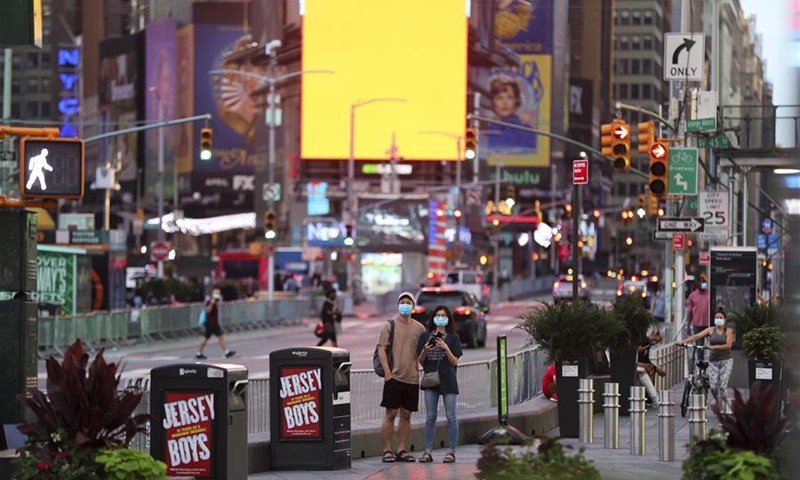US viral control fails Chinese students who had expected success within months
By Zhang Han Source:Global Times Published: 2020/7/4 17:21:58

People wearing face masks are seen on Times Square in New York, the United States, June 27, 2020. Photo: Xinhua
As coronavirus infections in the US kept deteriorating and reached 56,000 cases per day, breaking records six times in 10 days, Chinese students and their families are entrapped by the country's failure in tackling the pandemic as studying in the US has now become dangerous and no longer worthwhile.
Although the US has long led the infection and death toll list, the situation has further worsened in the past week when most states lifted their social distancing rules and resumed business.
Seeing the immediate spike in cases, newly admitted students reached by the Global Times are reluctant to head to the country for studies. Enrolled students on holidays also found themselves in a dilemma of whether to return to the country with such a doomsday prospect.
Lü Wenxin, who was about to study production at the American Film Institute in the fall semester, told the Global Times on Saturday that she had just decided to defer her offer to next spring.
The program depends a lot on fieldwork and practice, which means it can hardly be transferred online. "But luckily the school agreed for us students to defer our offers as long as we can prove difficulty attending courses on time," Lü said, noting she will use visa problems to explain the situation.
The majority of American universities will start their fall semesters in mid or late August while some will not receive new and returning students until September.
Visa congestion is a serious problem as the US embassy and consulates in China suspended work as early as February. They still haven't resumed visa consulting services.
Unfortunate students who are not allowed to postpone enrollment will have to choose between dropping the offer, which also means throwing their money and time spent on applications into the water, or fly to the US with a high risk of infection even if they manage to get visas and plane tickets.
Dou Meili, who was still weighing on her JD offers, told the Global Times that she had to pay normal tuition fees for online courses, which will definitely be of lower quality.
"I am not sure whether I can handle the already heavy coursework with a day-night reversal schedule. But the good news is I save money for accommodation in the US," Dou said.
Enrolled students who returned to China for a break, hoping the US could bring the virus under control before the fall semester, have been let down as the country shows no sign of walking out of the pandemic.
Multiple US universities are reporting coronavirus cases among students in special courses or sports training at school. Some are preparing for a combination of online and offline courses for the fall semester, which poses a great danger for clustered infections.
A latest alarming incident was that at the University of Washington in Seattle, where more than 100 students were infected after a dozen parties and other activities occurred in violation of social distance requirements.
At least 19 states have issued mask mandates, ordering people to wear masks in public places. The fine for a violation in Texas is $250.
But a Texas-based graduate student surnamed Lin questioned the effectiveness of such a mandate.
People wear cloth masks or use scarves when medical ones are available. They are too stubborn to obey the rules and the state just cannot implement it in an effective way. It's hearsay that Texas will impose another lockdown again due to a resurgence, Lin said.
"Seeing people around me already hanging out all the time, my impression is that Americans don't really care about the virus and they don't think they should behave themselves to help fight it. They are really indifferent to the disaster and their dying fellow countrymen, who are merely numbers in news reports," Lin stressed.
RELATED ARTICLES:
Posted in: SOCIETY